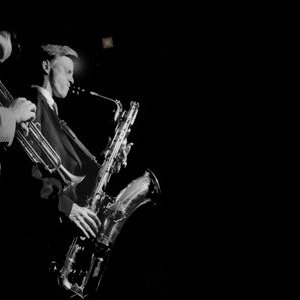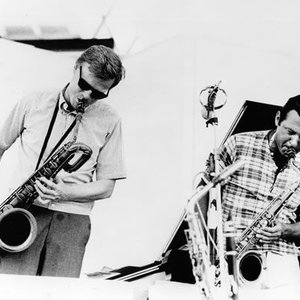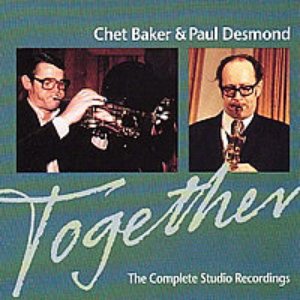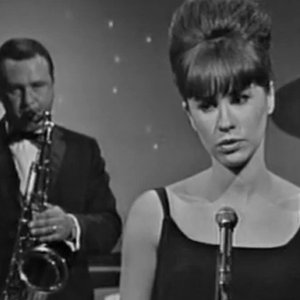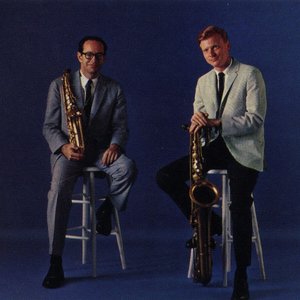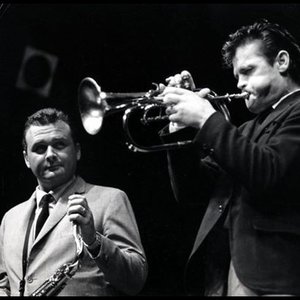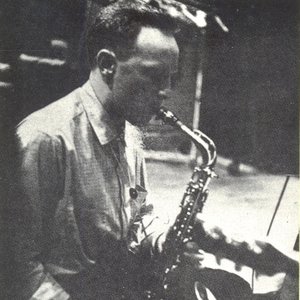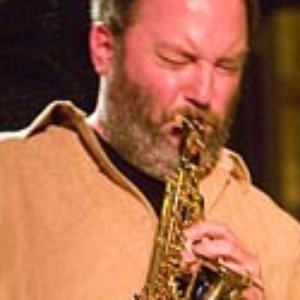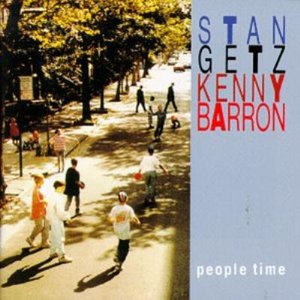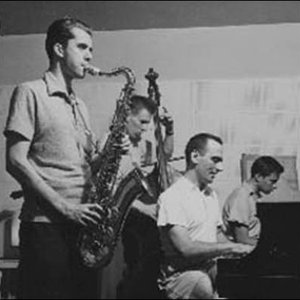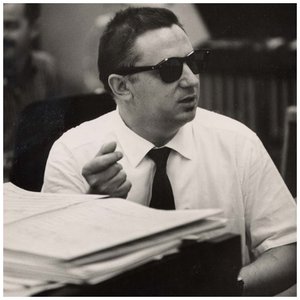Biography
Stan Getz (Stanley Gayetzky, February 2, 1927 Philadelphia – June 6, 1991 Malibu, California) was an American jazz tenor saxophone player. Known as "The Sound" because of his warm, lyrical tone, Getz's prime influence was the wispy, mellow tone of his idol, Lester Young.
His parents were Ukrainian Jews who immigrated from Kyiv city, Ukraine in 1903. The family later moved to New York City for better jobs. Stan worked hard in school receiving straight "A's" on average and finished 6th grade close to the top of his class. Stan's major interest was in musical instruments, and he felt a need to play every instrument in his sight. He played a number of instruments before his father bought him his first saxophone at the age of 13. Even though his father also got him a clarinet, Stan instantly fell in love with the saxophone and began practicing 8 hours a day. In 1941, he was accepted into the All City High School Orchestra of New York City. This gave Stan a chance to receive a private, free tutor from the New York Philharmonic, Simon Kovar - a bassoon player. He also began to spend more time playing the saxophone. He eventually dropped out of school in order to pursue his musical career, but was later sent back to the classroom by the school system’s truancy officers.
In 1943, he was accepted into Jack Teagarden's band, and because of his youth he became Teagarden's ward. Getz also played along with Nat King Cole and Lionel Hampton. After playing for Stan Kenton, Jimmy Dorsey, and Benny Goodman, Getz was a soloist with Woody Herman from 1947 to 1949 in 'The Second Herd' and he first gained wide attention as one of the band's saxophonists, who were known collectively as 'The Four Brothers', the others being Serge Chaloff, Zoot Sims and Herbie Steward. With Herman, he had a hit with "Early Autumn" and after Getz left 'The Second Herd' he was able to launch his solo career. He would be the leader on almost all of his recording sessions after 1950.
During the early '50s, Getz broke away from the Lester Young style to form his own musical identity and he was soon among the most popular of all jazzmen. He discovered Horace Silver in 1950 and used him in his quartet for several months. After touring Sweden in 1951, he formed an exciting quintet that co-featured guitarist Jimmy Raney; their interplay on up-tempo tunes and tonal blend on ballads was quite memorable. Getz's playing helped Johnny Smith have a hit in "Moonlight in Vermont," during 1953-1954 Bob Brookmeyer made his group a quintet and, despite some drug problems during the decade, Getz was a constant poll winner. After spending 1958-1960 in Europe, the tenorman returned to the U.S. and recorded his personal favorite album, Focus, with arranger Eddie Sauter's Orchestra.
Getz became a central figure in introducing bossa nova music to the U.S. audience. Teaming with guitarist Charlie Byrd, who had just returned from a U.S. State Department tour of Brazil, Getz recorded Jazz Samba in 1962 and it became a hit. The title track was an adaptation of Antonio Carlos Jobim's "One Note Samba". Getz won the Grammy for Best Jazz Performance of 1963 for "Desafinado". As a follow-up, Getz recorded Jazz Samba Encore! with one of the originators of bossa nova, Brazilian guitarist Luiz Bonfa.
He then recorded the album Getz/Gilberto with Tom Jobim, João Gilberto and his wife, Astrud Gilberto. Their "The Girl from Ipanema" won a Grammy Award. The piece became one of the most well-known latin jazz cuts of all time. Getz/Gilberto won two Grammys (Best Album and Best Single), besting The Beatles' A Hard Day's Night, a victory for Bossa Nova and Brazilian jazz. A live album, Getz/Gilberto Vol. 2, followed, as did Getz Au Go Go, a recording made live at the Cafe Au Go Go. Unfortunately, Getz' affair with Astrud Gilberto brought an end to his musical partnership with her and her husband and he began to move away from bossa-nova and back to cool jazz. Even while still working with the Gilbertos, he recorded Nobody Else But Me an album of straightforward jazz with a new quartet including vibraphonist Gary Burton, but Verve Records, wishing to continue building the Getz brand with bossa-nova, refused to release it. It eventually came out 30 years later, after Getz had died.
In 1972, Getz recorded in the fusion idiom with Chick Corea and Stanley Clarke. This group, without Getz, went on to become the famous Return to Forever, and many of the pieces including "La Fiesta" remained in their repertoire. In this period Getz experimented with an Echoplex on his saxophone, for which critics vilified him. He eventually discarded fusion and "electric jazz", returning to acoustic jazz, while at the same time gradually de-emphasizing the Bossa Nova, opting for more esoteric and less-mainstream jazz. He had a cameo in the movie The Exterminator (1980).
Towards the end of his life the now drug-free Getz had another creative peak with a group including the pianist Kenny Barron, whom Getz described as "my musical other half".
In 1986, he was inducted into the Down Beat Jazz Hall of Fame.
Getz married Beverly Byrne, a vocalist with the Gene Krupa band, on 7 November 1946; they had three children together: Steven, David, and Beverly (who married Michael McGovern).
Getz became involved with drugs and alcohol while a teenager. In 1954, he was arrested for attempting to rob a pharmacy to get a morphine fix. As he was being processed in the prison ward of Los Angeles County-USC Medical Center, Beverly gave birth to their third child one floor below.
Getz tried to escape his narcotics addiction by moving to Copenhagen. He married Swedish aristocrat Monica Silfverskiöld on 3 November 1956 and had two children with her: Pamela and Nicolas. In 1957 Swedish girlfriend Inga Torgnér gave birth to a son Peter. Stan divorced Monica in 1987.
Zoot Sims, who had known Getz since their time with Herman, once described him as 'a nice bunch of guys', as a consequence of the wide behavioural range of which Getz was capable. In the final stages of his life Getz was able to end his addictions.
Getz died of liver cancer in 1991. His body was cremated and the ashes scattered at sea, off the coast of Malibu, California.
In 1998 the 'Stan Getz Media Center and Library' at the Berklee College of Music was dedicated through a donation from the Herb Alpert Foundation.
——-
Chesney Henry "Chet" Baker, Jr. (December 23, 1929 – May 13, 1988) was an American jazz trumpeter, flugelhornist and vocalist.
Baker earned much attention and critical praise through the 1950s, particularly for albums featuring his vocals (Chet Baker Sings, It Could Happen to You). Jazz historian David Gelly described the promise of Baker's early career as "James Dean, Sinatra, and Bix, rolled into one." His well-publicized drug habit also drove his notoriety and fame, Baker was in and out of jail frequently before enjoying a career resurgence in the late 1970s and '80s.
Baker was born and raised in a musical household in Yale, Oklahoma; his father, Chesney Baker, Sr., was a professional guitar player, and his mother, Vera (née Moser) was a talented pianist who worked in a perfume factory. His maternal grandmother, Randi Moser, was Norwegian. Baker began his musical career singing in a church choir. His father introduced him to brass instruments with a trombone, which was replaced with a trumpet when the trombone proved too large.
Baker received some musical education at Glendale Junior High School, but left school at age 16 in 1946 to join the United States Army. He was posted to Berlin, where he joined the 298th Army band. After leaving the army in 1948, he studied theory and harmony at El Camino College in Los Angeles. He dropped out in his second year, however, re-enlisting in the army in 1950. Baker became a member of the Sixth Army Band at the Presidio in San Francisco, but was soon spending time in San Francisco jazz clubs such as Bop City and the Black Hawk. Baker once again obtained a discharge from the army to pursue a career as a professional musician.
Baker's earliest notable professional gigs were with saxophonist Vido Musso's band, and also with tenor saxophonist Stan Getz, though he earned much more renown in 1952 when he was chosen by Charlie Parker to play with him for a series of West Coast engagements.
In 1952, Baker joined the Gerry Mulligan Quartet, which was an instant phenomenon. Several things made the Mulligan/Baker group special, the most prominent being the interplay between Mulligan's baritone sax and Baker's trumpet. Rather than playing identical melody lines in unison like bebop giants Charlie Parker and Dizzy Gillespie, the two would complement each other's playing with contrapuntal touches, and it often seemed as if they had telepathy in anticipating what the other was going to play next. The Quartet's version of "My Funny Valentine", featuring a Baker solo, was a hit, and became a tune with which Baker was intimately associated.
The Quartet found success quickly, but lasted less than a year because of Mulligan's arrest and imprisonment on drug charges. Baker formed his own quartet with pianist and composer Russ Freeman in 1953, along with bassists Carson Smith, Joe Mondragon, and Jimmy Bond and drummers Shelly Manne, Larry Bunker, and Bob Neel. The Chet Baker Quartet found success with their live sets, and they released a number of popular albums between 1953 and 1956. In 1953 and 1954, Baker won the Down Beat and Metronome magazines' Readers Jazz Polls, beating the era's two top trumpeters, Miles Davis and Clifford Brown. Down Beat readers also voted Baker as the top jazz vocalist in 1954. In 1956, Pacific Jazz released Chet Baker Sings, a record that increased his profile but alienated traditional jazz fans; he would continue to sing throughout his career.
Due to Baker's chiseled features, he was approached by Hollywood studios, and he made his acting debut in the film Hell's Horizon, released in the fall of 1955. He declined an offer of a studio contract, preferring life on the road as a musician. Over the next few years, Baker fronted his own combos, including a 1955 quintet featuring Francy Boland, where Baker combined playing trumpet and singing. In 1956 Chet Baker completed an eight month tour of Europe, where he recorded Chet Baker In Europe.
He became an icon of the West Coast "cool school" of jazz, helped by his good looks and singing talent. Baker's 1956 recording, released for the first time in its entirety in 1989 as The Route, with Art Pepper, helped further the West Coast jazz sound and became a staple of cool jazz.
Baker began using heroin in the 1950s, resulting in an addiction that lasted the remainder of his life. At times, Baker pawned his instruments for money to maintain his drug habit. In the early 1960s, he served more than a year in prison in Italy on drug charges; he was later expelled from both West Germany and the United Kingdom for drug-related offenses. Baker was eventually deported from West Germany to the United States after running afoul of the law there a second time. He settled in Milpitas in northern California, where he played in San Jose and San Francisco between short jail terms served for prescription fraud.
In 1968, Baker was savagely beaten (allegedly while attempting to buy drugs) after a gig in The Trident restaurant in Sausalito, California sustaining severe cuts on the lips and broken front teeth, which ruined his embouchure. He stated in the film Let's Get Lost that an acquaintance attempted to rob him one night but backed off, only to return the next night with a group of several men who chased him. He entered a car and became surrounded. Instead of rescuing him, the people inside the car pushed him back out onto the street, where the chase by his attackers continued, and subsequently he was beaten to the point that his teeth, never in good condition to begin with, were knocked out, leaving him without the ability to play his horn. He took odd jobs, among them pumping gas. Meanwhile he was fitted for dentures and worked on his embouchure. Three months later he got a gig in New York City.
Between 1966 and 1974, Baker mostly played flugelhorn and recorded music that could mostly be classified as West Coast jazz.
After developing a new embouchure resulting from dentures, Baker returned to the straight-ahead jazz that began his career. He relocated to New York City and began performing and recording again, including with guitarist Jim Hall. Later in the 1970s, Baker returned to Europe, where he was assisted by his friend Diane Vavra, who took care of his personal needs and otherwise helped him during his recording and performance dates.
From 1978 until his death in 1988, Baker resided and played almost exclusively in Europe, returning to the USA roughly once a year for a few performances. This was Baker's most prolific era as a recording artist. However, as his extensive output is strewn across numerous, mostly small European labels, none of these recordings ever reached a wider audience, even though many of them were well received by critics, who maintain that the period was one of Baker's most mature and rewarding. Of particular importance are Baker's quartet featuring the pianist Phil Markowitz (1978–80) and his trio with guitarist Philip Catherine and bassist Jean-Louis Rassinfosse (1983–85). He also toured with saxophonist Stan Getz during this period.
In 1983, British singer Elvis Costello, a longtime fan of Baker, hired the trumpeter to play a solo on his song "Shipbuilding", from the album Punch the Clock. The song exposed Baker's music to a new audience. Later, Baker often featured Costello's song "Almost Blue" (inspired by Baker's version of "The Thrill Has Gone") in his concert sets, and recorded the song for Let's Get Lost, a documentary film about his life.
The video material recorded by Japanese television during Baker's 1987 tour in Japan showed a man whose face looked much older than he was, but his trumpet playing was alert, lively and inspired. Baker recorded the live album Chet Baker in Tokyo with his quartet featuring pianist Harold Danko, bassist Hein van de Geyn and drummer John Engels less than a year before his death, and it was released posthumously. Silent Night, a recording of Christmas music, was recorded with Christopher Mason in New Orleans in 1986 and released in 1987.
Baker's compositions included "Chetty's Lullaby", "Freeway", "Early Morning Mood", "Two a Day", "So Che Ti Perderò" ("I Know I Will Lose You"), "Il Mio Domani" ("My Tomorrow"), "Motivo Su Raggio Di Luna" ("Tune on a Moon Beam"), "The Route", "Skidadidlin'", "New Morning Blues", "Blue Gilles", "Dessert", and "Anticipated Blues".
At about 3:10 am on May 13, 1988, Baker was found dead on the Prins Hendrikkade, near the Zeedijk, the street below his second-story room of Hotel Prins Hendrik in Amsterdam, Netherlands, with serious wounds to his head. Heroin and cocaine were found in his hotel room, and an autopsy also found these drugs in his body. There was no evidence of a struggle, and the death was ruled an accident. A plaque outside the hotel memorializes him and the room he was staying in, No. 210, is named "The Chet Baker Room".
Baker is buried at the Inglewood Park Cemetery in Inglewood, California.
- Baker was photographed by William Claxton for his book Young Chet: The Young Chet Baker. An Academy Award-nominated 1988 documentary about Baker, Let's Get Lost, portrays him as a cultural icon of the 1950s, but juxtaposes this with his later image as a drug addict. The film, directed by fashion photographer Bruce Weber, was shot in black-and-white and includes a series of interviews with friends, family (including his three children by third wife Carol Baker), associates and women friends, interspersed with film from Baker's earlier life, and with interviews with Baker from his last years.
- Time after Time: The Chet Baker Project, written by playwright James O'Reilly, toured Canada in 2001 to much acclaim. The musical play Chet Baker – Speedball explores aspects of his life and music, and was premiered in London at the Oval House Theatre in February 2007, with further development of the script and performances leading to its revival at the 606 Club in the London Jazz Festival of November 2007.
- Baker was reportedly the inspiration for the character Chad Bixby, played by Robert Wagner in the 1960 film All the Fine Young Cannibals. Another film, to be titled Prince of Cool, about Baker's life, was cancelled as of January 2008.
- In 1991, singer/songwriter David Wilcox recorded the song "Chet Baker's Unsung Swan Song" on his album Home Again, speculating on what might have been Baker's last thoughts before falling to his death. The song was later covered by k.d. lang as "My Old Addiction" on her 1997 album Drag.
- The song "Chet Baker", which appears on the 2007 CD Wally Page and Johnny Mulhern: Live at the Annesley House, by Irish folk singer-songwriter Wally Page, describes the end of Baker's life in Amsterdam.
- Jeroen de Valk has written a biography of Baker which is available in several languages: Chet Baker: His Life and Music is the English translation.
Other biographies include James Gavin's Deep In A Dream—The Long Night of Chet Baker, and Matthew Ruddick's Funny Valentine. Baker's "lost memoirs" are available in the book As Though I Had Wings, which includes an introduction by Carol Baker.
- He is portrayed by Ethan Hawke in the 2015 film Born to Be Blue.
- The Australian electronica musician Nicholas James Murphy chose Chet Faker as his stage name, in order to pay homage to Chet Baker, who was a big influence for him.
Honors
In 1987 Chet Baker was inducted into the Big Band and Jazz Hall of Fame.
In 1989 he was elected to Down Beat Jazz Hall of Fame by that magazine's Critics Poll.
In 1991 he was inducted into the Oklahoma Jazz Hall of Fame.
In 2005 Oklahoma Governor Brad Henry and the Oklahoma House of Representatives proclaimed July 2 as "Chet Baker Day".
In 2007 Mayor of the City of Tulsa, Kathy Taylor, proclaimed December 23 as "Chet Baker Day".
On October 10, 2015 Yale, Oklahoma held the inaugural Chet Baker Jazz Festival in Baker's honor.
Artist descriptions on Last.fm are editable by everyone. Feel free to contribute!
All user-contributed text on this page is available under the Creative Commons Attribution-ShareAlike License; additional terms may apply.

